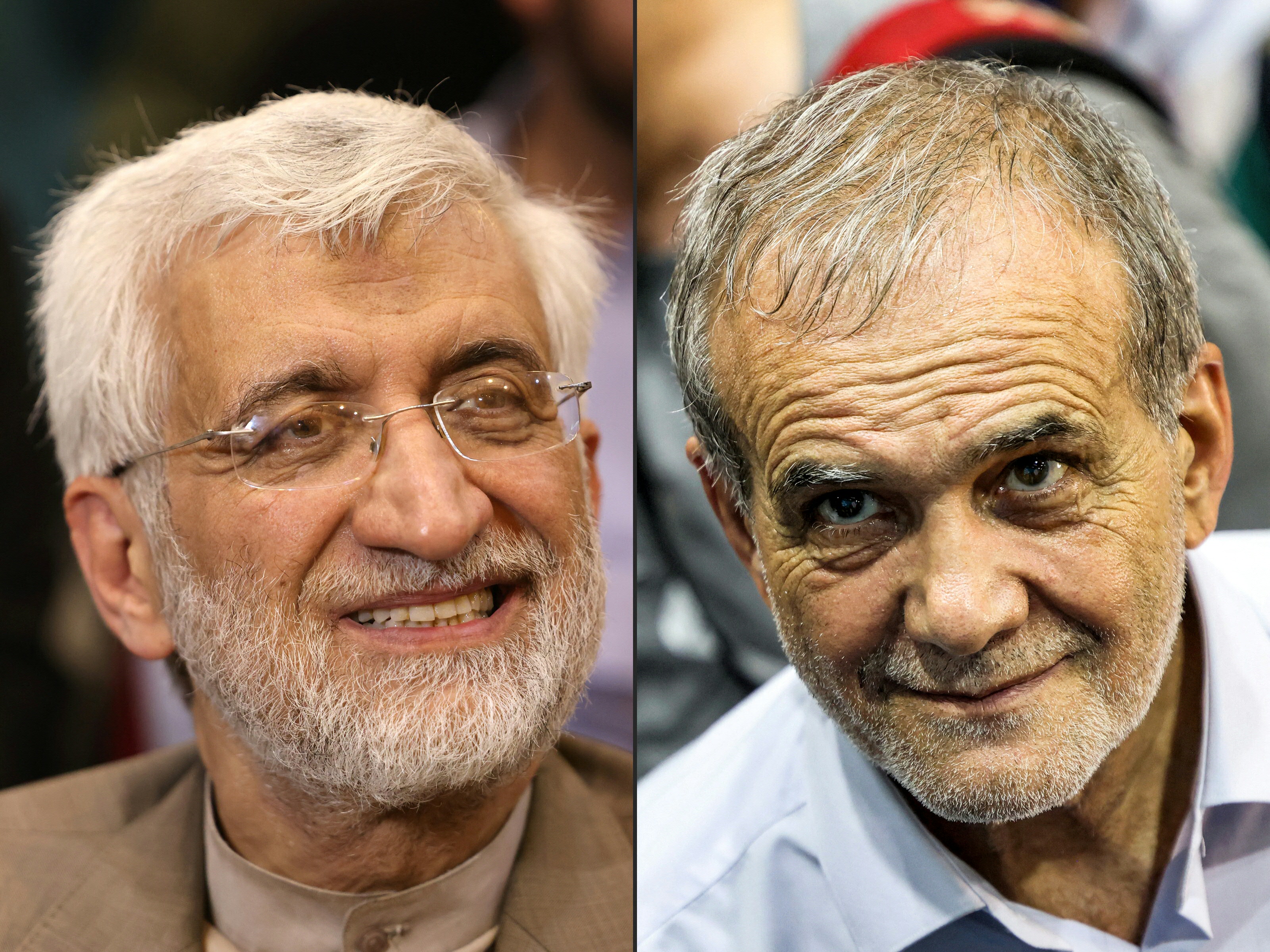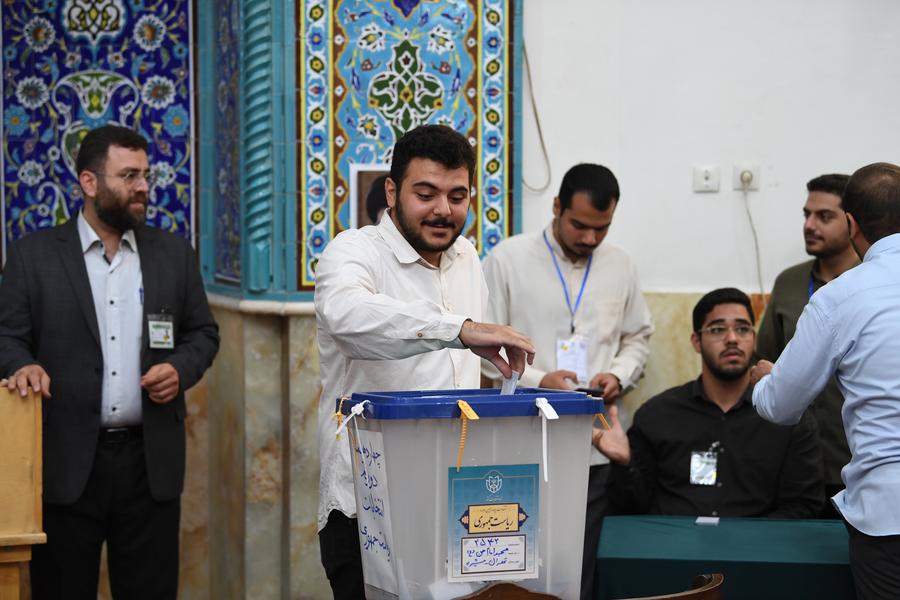
TEHERAN - After a highly-contested first round of presidential elections, Iran is set for a runoff vote on July 5, as none of the candidates have secured the required 50 percent of votes, Iran's Election Headquarters Spokesperson Mohsen Eslami said Saturday.
The results show that reformist Masoud Pezeshkian, Iran's former health minister, received more than 42 percent of the votes, while principlist Saeed Jalili, the former chief negotiator in the nuclear talks between Tehran and world powers, garnered over 38 percent of the total.
As per the Iranian constitution, a candidate wins the first round of the presidential election with an absolute majority of more than 50 percent. If no candidate reaches the threshold in the first round, a runoff election will be held on the Friday following the election day between the two candidates with the highest number of votes
As per the Iranian constitution, a candidate wins the first round of the presidential election with an absolute majority of more than 50 percent. If no candidate reaches the threshold in the first round, a runoff election will be held on the Friday following the election day between the two candidates with the highest number of votes.
Analysts believe that regardless of who wins in the upcoming runoff, the key focus for Iran's next president will be navigating the economic challenges posed by Western sanctions, addressing heightened tensions with Israel, and enhancing ties with neighboring countries.
Low turnout
Voting for the election ended at 12:00 a.m. Saturday local time (2030 GMT on Friday) after 16 straight hours, being extended for three times or six hours from the scheduled closing time.
Tens of millions of Iranian citizens cast their ballots at close to 59,000 polling stations in more than 95 states.
According to Iranian authorities, over 61 million people are eligible to vote in the election, but the voter turnout was only 40 percent, lower than the 48.8 percent turnout in Iran's previous presidential election in 2021.
ALSO READ: Iran remains an important regional player
In the lead-up to the election, the Iranian government had been actively promoting voter participation, prioritizing an increase in voter turnout. Iran's Supreme Leader Ali Khamenei has said that participation in the polls is essential "for the viability of the Islamic Republic system."
"The durability, consistency, dignity and reputation of the Islamic Republic in the world depend on the presence of the people," he said after casting the first ballot on Friday.

A total of 80 political heavyweights registered to participate in this election. Iran's Guardian Council approved six candidates earlier this month to join the race.
As Amir-Hossein Ghazizadeh Hashemi, the current vice president, and Alireza Zakani, the mayor of Tehran, announced their withdrawals days before its commencement, ultimately, Mohammad Baqer Qalibaf, the parliamentary speaker; Mostafa Pourmohammadi, a former interior and justice minister, Jalili and Pezeshkian emerged as the final four contenders for Iran's highest executive office.
Apart from Pezeshkian and Jalili, Qalibaf received 13.8 percent of the votes, while Pourmohammadi garnered 0.8 percent, according to Iran's Election Headquarters.
Reformist vs principlist
Iran's 14th presidential election, initially set for 2025, was moved up following the unexpected death of President Ebrahim Raisi and his entourage in a helicopter crash on May 19.
Following the incident, Khamenei reassured Iranians that there would be "no interruption" to the country's affairs.
During the election, candidates have also committed to following the late President Raisi's trajectory. Nevertheless, notable disagreements persist between Pezeshkian and Jalili on matters including relations with Western nations and tackling domestic economic issues.
During the election debates, Pezeshkian advocated for economic reforms and increased social freedom and inclusivity. He expressed his intention to achieve national economic growth through strengthening regional and global relations
Pezeshkian, 70, served as Iran's health minister from 2001 to 2005; he had previously worked as a heart surgeon.
ALSO READ: Iran, Bahrain start talks on release of Iran's frozen funds
During the election debates, Pezeshkian advocated for economic reforms and increased social freedom and inclusivity. He expressed his intention to achieve national economic growth through strengthening regional and global relations.
In the final debate held on Tuesday, Pezeshkian said that "we have to resolve our problems with the world, we have to resolve issues" about the nuclear deal.
Jalili, 59, ran as a qualified candidate in the presidential elections of 2013 and 2021. In 2021, he withdrew his candidacy in support of Raisi.
Jalili holds a more conservative and hardline stance on relevant issues. During the debate, Jalili criticized the United States for exerting "maximum pressure" on Iran and said that he would not seek to improve relations with Western countries.
"We should make the enemy regretful about sanctioning Iran through economic means," Jalili said in the final debate, advocating for stronger economic ties with Latin American and African nations to defuse the US-led sanctions against the country.
Future path
While most experts agree that the political direction of Iran will not undergo significant changes, Iranian citizens are still hopeful that the incoming president will implement effective solutions to tackle the country's severe economic challenges and navigate the increasing tensions with Israel and Western powers.
"The main domestic issue will be related to the economy," said Mostafa Khoshcheshm, a Tehran-based international affairs analyst.
A recent report from the International Monetary Fund highlights Iran's dire economic situation, with domestic inflation soaring to 35 percent and unemployment at 8.9 percent. The main focus for the Iranian people now revolves around how to enhance exports, reduce inflation, and boost employment opportunities.

Due to Iran's current economic hardships, largely attributed to sanctions led by the United States and Western countries, both Pezeshkian and Jalili have explicitly stated their intention to seek the lifting of US sanctions against Iran.
However, pundits argue that because of the substantial disagreements between Iran and the United States over reviving the Iran nuclear deal, and given Iran's current tensions with Israel, prospects for a near-term improvement in Iran's relations with the West appear dim.
Therefore, Iran's diplomatic focus in the future is likely to center on furthering relationships with countries in the Global South and neighboring regions.
ALSO READ: Iran approves 6 candidates for presidential race
"The most important plans to be pursued by Iran's next administration would be making full use of the country's membership in the Shanghai Cooperation Organization and BRICS, the regional geopolitics and the foreign policy opportunities through further interactions with neighbors," said Seyed Reza Sadr al-Hosseini, a Tehran-based senior expert on regional issues.
"As stressed by the (supreme) leader (Ali Khamenei), Iran's approach will continue to be an East-oriented one regardless of who would become president," said Khoshcheshm.



